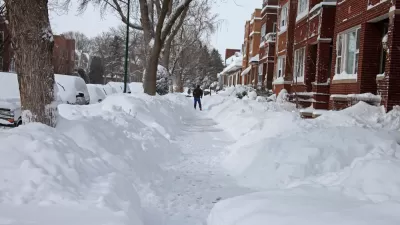With the coming release of Chicago's new Complete Streets Design Guidelines, the city is undertaking a "seismic policy shift" in how it evaluates all transportation projects: by making pedestrians the primary mode for consideration.
For nearly a century, America's cities have based their transportation decisions on prioritizing what's best for the car. But a significant shift being led by cities like Portland and Chicago is giving alternative forms of transportation as much, or more, weight in design and decision-making.
Emily Badger looks at Chicago's new Complete Streets Design Guidelines which contain "a small-sounding but seismic policy shift: From now on, in the design guidelines for every effort from major streetscape projects to minor roadside electrical work, transportation work must defer to a new 'default modal hierarchy.' The pedestrian comes first."
"My feeling is that we have to swing the pendulum in the other direction," says Gabe Klein, commissioner of Chicago’s Department of Transportation. "The fact is that the transit user is also a pedestrian, a cyclist is also a pedestrian, an auto user is also a pedestrian. You may not chose the other modes every day, but every day you’re a pedestrian."
FULL STORY: New Chicago Plan: Pedestrians Come First

Planetizen Federal Action Tracker
A weekly monitor of how Trump’s orders and actions are impacting planners and planning in America.

Chicago’s Ghost Rails
Just beneath the surface of the modern city lie the remnants of its expansive early 20th-century streetcar system.

San Antonio and Austin are Fusing Into one Massive Megaregion
The region spanning the two central Texas cities is growing fast, posing challenges for local infrastructure and water supplies.

Since Zion's Shuttles Went Electric “The Smog is Gone”
Visitors to Zion National Park can enjoy the canyon via the nation’s first fully electric park shuttle system.

Trump Distributing DOT Safety Funds at 1/10 Rate of Biden
Funds for Safe Streets and other transportation safety and equity programs are being held up by administrative reviews and conflicts with the Trump administration’s priorities.

German Cities Subsidize Taxis for Women Amid Wave of Violence
Free or low-cost taxi rides can help women navigate cities more safely, but critics say the programs don't address the root causes of violence against women.
Urban Design for Planners 1: Software Tools
This six-course series explores essential urban design concepts using open source software and equips planners with the tools they need to participate fully in the urban design process.
Planning for Universal Design
Learn the tools for implementing Universal Design in planning regulations.
planning NEXT
Appalachian Highlands Housing Partners
Mpact (founded as Rail~Volution)
City of Camden Redevelopment Agency
City of Astoria
City of Portland
City of Laramie



























